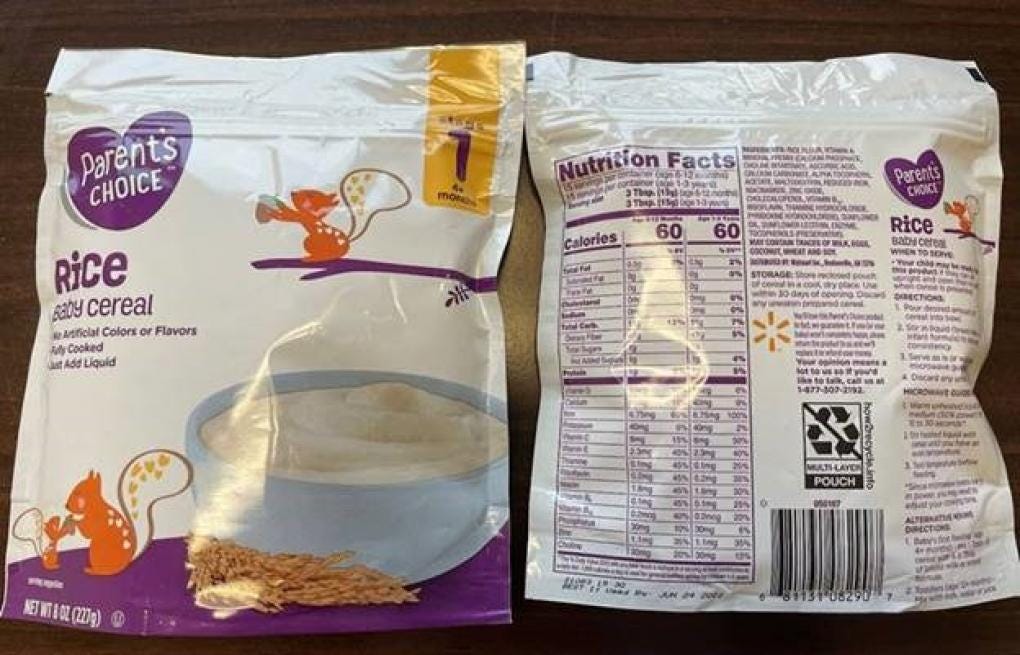
- Three lots of "Parent's Choice" rice baby cereals, sold at Walmart and online, have been recalled.
- Routine FDA testing showed high levels of inorganic arsenic, which can affect babies' development.
- Congress has been pressuring manufacturers and the FDA to do more to protect babies from dangerous heavy metals.
Some popular baby rice cereals sold at Walmart and online have been voluntarily recalled after routine testing showed the products have high levels of inorganic arsenic, the US Food and Drug Administration announced Friday.
Exposure to heavy metals in childhood is linked to permanent dips in IQ and damaged long-term brain function.
While internal testing showed the Parent's Choice cereals, made by Maple Island, were below the FDA's limits for inorganic arsenic, the company issued the recall "out of an abundance of caution," the FDA said.
The affected cereals were sold after April 5, and include:
- Lot 21083 with UPC Code #00681131082907 with a best if used by date of JUN 24 2022.
- Lot 21084 with UPC Code #00681131082907 with a best if used by date of JUN 25 2022
- Lot 21242 with UPC Code #00681131082907 with a best if used by date of NOV 30 2022
Parents who purchased any of these products should toss them or return it to Walmart for a refund. No other products are known to be affected, and no illnesses have been reported.
More attention on heavy metals in baby foods
The FDA acknowledges that trace elements of some metals "are widely present in the environment, including water, soil and food," and can't be completely eliminated. Its "Closer to Zero" task force works to help reduce such metals in baby food without sacrificing nutrition.
But Congress has been putting pressure on the FDA to work faster, and pressure on manufacturers to do more to protect their youngest consumers.
A February report from the House's Subcommittee on Economic and Consumer Policy collected documents and test results from seven of the country's biggest baby food manufacturers. They found the baby foods had up to 91 times the arsenic level, up to 177 times the lead level, up to 69 times the cadmium level, and up to 5 times the mercury level as what's allowed in bottled water.
Rice cereals seemed to be particularly problematic.
Then, late last month, the same subcommittee said the baby food companies haven't sufficiently changed their ways, and the FDA isn't acting fast enough to encourage them to. Walmart in particular was called out for weakening its internal arsenic standard n 2018, "an extreme course reversal on efforts to protect babies' neurological development," the subcommittee said.
In a statement to Insider, Walmart didn't directly address the claim.
The September report revealed "that companies not only under-report the high levels of toxic content in their baby food, but also knowingly keep toxic products on the market," the subcommittee said in a statement.
Parents can avoid rice cereals
Dr. Rashmi Jain, a concierge pediatrician and founder of BabiesMD, told Insider after the February report that concerned parents can stay away from rice cereals and fruit juices. Emphasizing a varied diet helps avoid toxic metals, too, she said. Regular pediatrician visits can identify development problems, whether influenced by a child's diet or something else.
"While many of us were exposed to these same toxicities in foods we ate when we were growing up and did just fine," she said, "we must hold food manufacturers accountable to reduce toxicities that may arise from combination of ingredients and production processes."
